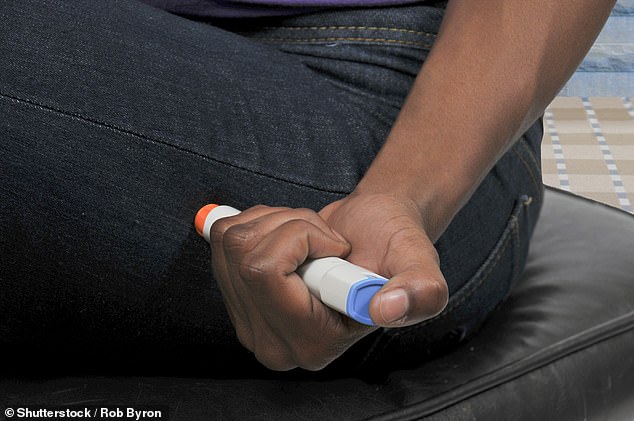Just Eat issues an urgent ‘do not eat’ warning on hundreds of popular products due to deadly contamination
Popular food delivery app Just Eat has issued an urgent warning to customers in response to the contamination of a large number of food products.
A number of products containing traces of mustard contain undeclared peanuts, which pose a danger to consumers with allergies.
Mustard powder and flavoring are a common ingredient in countless sauces, dips, salads and pre-packaged sandwiches sold through the delivery app.
The Just Eat warning, which has now been issued to both UK and Irish customers, follows similar alerts from food safety regulators in both countries.
Just Eat’s warning, which has now been issued to both UK and Irish customers, follows a warning from food safety regulators in both countries.

A number of products containing mustard, mustard powder or mustard flour contain undeclared peanuts that pose a danger to any consumer with an allergy
The UK Food Standards Agency (FSA) has traced the contaminated mustard ingredients to three Indian manufacturers who supply British companies, which in turn supply goods to a large number of British restaurants and takeaways.
This warning has now been reiterated by Just Eat directly to its customers via an email stating: ‘The Food Standards Agency has made us aware that they are warning people with a peanut allergy against consuming foods that contain or could contain mustard. to avoid. mustard powder or mustard flour, as these ingredients may be contaminated with peanuts.
‘These ingredients can be found in foods such as dips, sauces, salads and pre-packed sandwiches.
‘The FSA is working hard to identify products that may be contaminated with these mustard ingredients due to the severity of some allergic reactions to peanuts.
‘Therefore, as a precaution, we wanted to ensure that our Just Eat customers are aware of this situation so that people with a peanut allergy have up-to-date information about the potential risk and can take action to protect themselves.’
It continued: While the FSA is addressing this situation, in addition to checking for peanut-based ingredients, we strongly encourage our customers with a peanut allergy when ordering food via Just Eat to contact the restaurant, cafe or takeaway restaurant to ask if any of their products contain mustard.

About one in 50 children and one in 200 adults in Britain have a peanut allergy. Allergy sufferers who accidentally consume products containing peanuts may need to use an emergency injector as shown
‘Rest assured, food companies have a legal obligation to provide this information to customers and must understand your concerns.’
Mustard itself is an allergen for some people, meaning British companies are legally required to declare its use in food.
On Sunday, the FSA published 66 product recalls in Britain due to the peanut contamination.
Simone Miles, CEO of Charity Allergy UK, said the contamination will be worrying for many people with peanut allergies and their families.
“We understand the concern and anxiety this research is likely to cause for people with food allergies, especially as it further limits already limited food choices,” she said.
“This is a challenging and frustrating situation, but the safety of the allergy community must come first.
‘We strongly advise anyone with a peanut allergy to follow the FSA’s advice and avoid all foods containing mustard until further notice. It is essential not to take unnecessary risks with your health.’
About one in 50 children and one in 200 adults in Britain have a peanut allergy.
The number of patients has been increasing for years, a trend that some experts suspect is linked to a hyper-sanitary society that may weaken children’s immune systems.
Experts estimate that ten Britons die every year from an allergic reaction to food, while 5,000 people are admitted to hospital due to severe reactions.
Allergies can cause a variety of symptoms, but the most serious is a dangerous inflammation of the airways called anaphylaxis.
This can make it difficult or even impossible to breathe and can cause the body to go into a cardiac emergency, such as cardiac arrest, due to a lack of oxygen.
It is believed that children with allergies are at particular risk for severe reactions because small amounts of allergens, due to their smaller body size, trigger larger reactions.
Allergies are also often discovered in childhood, meaning parents may not have an emergency injection on hand if an allergic reaction occurs.
Relatives of those who have lost children to allergic reactions have repeatedly called for an allergy tsar to improve NHS services and awareness about allergies, to prevent avoidable ill-health and death.
